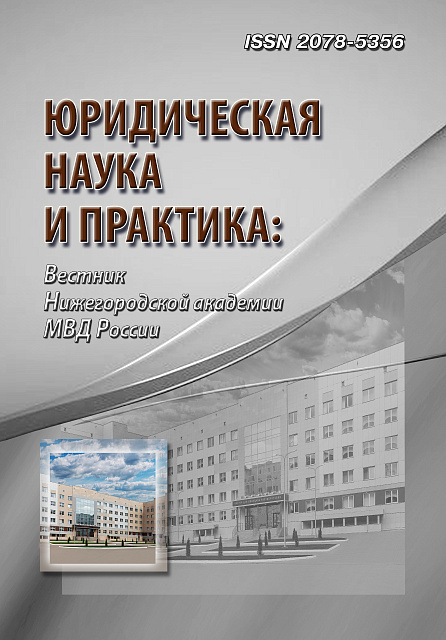Considering the relationship between any subjects of constitutional law, it should be noted that their interaction is the most effective and efficient. In this study, it is perceived as an analogue of the category “cooperation”; partnership is also considered as one of the components of this social phenomenon. Studying the essence of interaction between the actors under consideration allows us to understand the mechanisms and legal basis for its implementation for the subsequent modernization of legal regulation, based on the actual practice of its implementation, as well as on the needs of society and naturally occurring social processes.
interaction, subject of constitutional law, theory of interaction, constitutional legal regulation, theory of correlation, mutual influence, cooperation, partnership
1. Shilina S. A. The relationship between power and its subject: management of the verbal communicative code. Central Russian Bulletin of Social Sciences, 2009, no. 1, pp. 80–84. (In Russ.)
2. Tonkov E. E., Nifanov A. N., Khudokormov S. I. Interests of the local community as the basis for the activities of municipal representation. City management: theory and practice, 2018, no. 2 (29), pp. 20–30. (In Russ.)
3. Matuzov N. I. Concept and main priorities of Russian legal policy. Jurisprudence, 1997, no. 4, pp. 6–17. (In Russ.)
4. Kerimov A. D. State organization of public life: theoretical issues: monograph. Moscow: Norma Publ., 2014. 192 p. (In Russ.)
5. Spiridonov A.A. Parliamentary control in unity with the system of state control (supervision), municipal control and public control: modern understanding and development prospects. Lex russica, 2023, art. 76, no. 3, pp. 52–62. (In Russ.)
6. On the organization of the provision of state and municipal services: federal law no. 210-FZ of July 27, 2010 (as amended on December 25, 2023). Collection of legislative acts of the RF, 2010, no. 31, art. 4179. (In Russ.)
7. Regulations on the requirements for concluding agreements on interaction between multifunctional centers for the provision of state and municipal services and federal executive authorities, bodies of state extra-budgetary funds, government bodies of constituent entities of the Russian Federation, local governments, approved by the Decree of the Government of the Russian Federation of September 27, 2011 No. 797 (as amended on April 5, 2023). Collection of legislative acts of the RF, 2011, no. 40, art. 5559. (In Russ.)
8. Vasiliev S. A. Problems of development of organizational and legal foundations for the provision of state and municipal services to the population in multifunctional centers. Current problems of Russian law, 2013, no. 12, pp. 1572–1579. (In Russ.)
9. Lubennikova S. A. Legal regulation of the activities of multifunctional centers. Lex russica, 2017, no. 2, pp. 106–114. (In Russ.)
10. Starilov Yu. N., Davydov K. V. Validity of an administrative agreement. Administrative law and process, 2013, no. 6, pp. 36–41. (In Russ.)
11. Kravets I. A. Russian constitutionalism: Problems of formation, development and implementation. Saint Petersburg: Legal Center Press Publ., 2004. 675 p. (In Russ.)
12. Shayo A. Self-limitation of power (short course of constitutionalism). Moscow: Lawyer, 2001. 292 p. (In Russ.)
13. Astafichev P. A. Personnel of judicial and law enforcement agencies as a subject of joint jurisdiction of the federation and its subjects. Ex Jure, 2023, no. 1, pp. 21–37. (In Russ.)
14. Fadeev V. I. Ideas of a symphony of authorities and conciliarity and the development of popular representation in Russia. Modern society and law, 2011, no. 2 (3), pp. 3–15. (In Russ.)
15. Katin V. I. Current problems of partnership relations between the Russian Orthodox Church and the state in modern Russia: monograph. Saratov: Nauka Publ., 2016. 239 p. (In Russ.)
16. Tikhomirov Yu. A. Managing the affairs of society: (Subjects and objects of management in a social society). Moscow: Mysl Publ., 1984. 223 p. (In Russ.)
17. On the general principles of the organization of local self-government in the Russian Federation: federal law no. 131-FZ of October 6, 2003 (as amended on August 4, 2023). Collection of legislation of the RF, 2003, no. 40, art. 3822. (In Russ.)
18. Gogleva K. Yu. Judicial constitutional control as a guarantee of the separation of powers in the Russian Federation. Author’s abstract... candidate of legal sciences. Saint Petersburg: Saint Petersburg University of the Ministry of Internal Affairs of the Russian Federation, 2023. 29 p. (In Russ.)
19. Bezrukov A. V., Kozhevnikov O.A., Epifanov I. O. Interaction of legislative and executive bodies of state power in the federal budget process. Bulletin of Moscow University. Episode 21: Governance (state and society), 2023, no. 1, pp. 137–150. (In Russ.)
20. Vasiliev S. A. Constitutional and legal foundations of interaction between public associations and law enforcement agencies of Russia in the field of protection of human and civil rights and freedoms: monograph. 2nd ed. Moscow: University textbook, 2016. 116 p. (In Russ.)
21. On targeted social protection of the population in the Udmurt Republic: Law of the Udmurt Republic no. 89-RZ of December 23, 2004 (as amended on March 18, 2019). News of the Udmurt Republic, 2004, no. 199. (In Russ.)
22. Zenin S. S. Constitutional and legal basis for the implementation of state policy towards compatriots living abroad - Tyumen, 2024. 306 p. (In Russ.)
23. Vorobyova O. D., Topilin A. V., Khrolenko T. S. Reproduction of labor resources and migration policy. Migration Law, 2021, no. 2, pp. 21–25. (In Russ.)
24. Tonkov E. E. Modernization of legal forms of state activity: monograph. Moscow: Yurlitinform Publ., 2011. 256 p. (In Russ.)
25. Ilyinskaya E. V. Activities of local government bodies in the field of environmental protection and development of rural areas. Ostrovskie readings, 2016, no. 1, pp. 513–514. (In Russ.)












